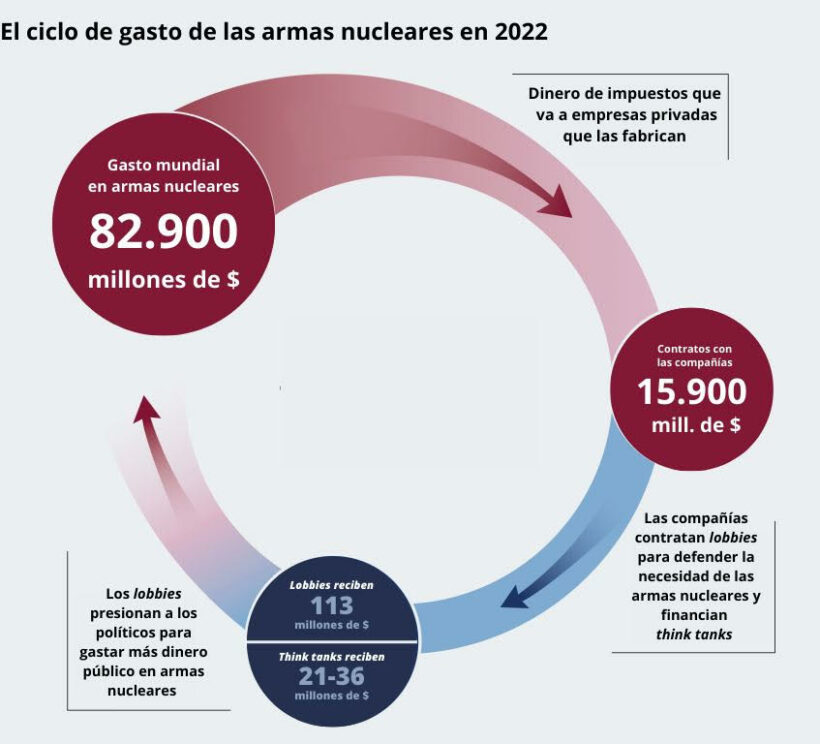Total grows for the third year in a row as the nine nuclear weapons states continue to modernise and expand their arsenals.
By Alliance for Nuclear Disarmament
According to a new report by the International Campaign to Abolish Nuclear Weapons (ICAN), which compiles the most authoritative figures on nuclear weapons spending, in 2022, the nine nuclear weapons states spent $82.9 billion on their arsenals, 3% more than in 2021. This amounts to spending of $157,664 per minute on nuclear weapons for that year.
The report, Wasted: 2022 Global Nuclear Weapons Spending, reveals that the US spent $43.7 billion. Although this was slightly lower than in 2021, the US still spent more on its arsenals than all other nuclear-armed countries combined. China spent a quarter of the US total, $11.7 billion, an increase of just over 6 percent. Russia was the third largest spender with $9.6 billion, an increase of 5.74 percent over the previous year. The country that increased its spending the most was India, with an increase of 21.8%. The other country to register a double-digit increase was the UK, which increased its spending by just over 11%.
82.9 billion dollars could have paid for the vaccination of 2 billion people against COVID-19 or provided clean water and sanitation for 1.275 million people for a year.
Arms companies involved in the production of nuclear weapons received new contracts worth just under $16 billion in 2022 and, in turn, spent $113 million on lobbying governments in the US and France alone. Globally, nuclear-armed countries have contracts with companies to produce nuclear weapons worth at least $278.6 billion, in some cases extending to 2040.
Nuclear weapons manufacturers and nuclear-armed states also spend millions on funding the work of think tanks that, in turn, influence government policy and public attitudes toward nuclear weapons.
Susi Snyder, ICAN’s Programme Coordinator and co-author of the report says: “It is appalling that these nine countries spent $82.9 billion on 12,500 nuclear weapons. These billions could have been spent on rebuilding after the devastating COVID-19 pandemic and on combating climate change and biodiversity loss. The arms industry takes about 35% of this money and she says to her shareholders that lobbying against nuclear disarmament is good for business. But fortunately, more and more investors are seeing nuclear weapons as a major risk and are divesting from these companies.
Alicia Sanders-Zakre, co-author of the report and ICAN’s Policy and Research Coordinator adds: “Nuclear weapons states are increasing spending every year, but the $82.9 billion they wasted in 2022 did nothing to improve global security, rather, they are making the situation worse. Real security is being provided through the Treaty on the Prohibition of Nuclear Weapons, where almost half of the UN member states reject these tools of terror and intimidation and collaborate to end the era of nuclear weapons for good”.
From Spain, Maribel Hernández, coordinator of the Alliance for Nuclear Disarmament, reminds non-nuclear states that “this increase in spending on nuclear weapons is something that affects us all as it increases the global nuclear threat. In the face of this trend that only brings us closer to catastrophe, countries that do not have nuclear weapons, such as Spain, also have something to say. It is necessary that they take a clear position against this type of armament and adhere to the Treaty on the Prohibition of Nuclear Weapons”.
You can download the full report here.






